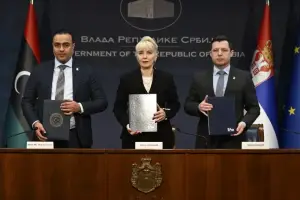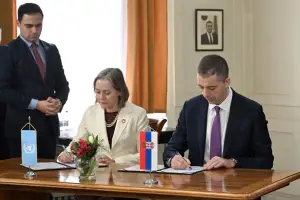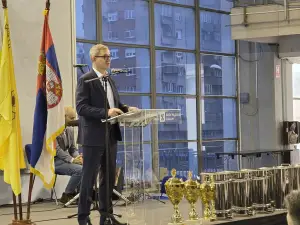- Serbia
Get to know Serbia
- Citizens
Culture and science
Health services
Pension and disability insurance
- Business
Employment
Economy
- Media
- Government
- Contact
Keep in touch
Contact form
Back
Keepin touch
Whether you have a question, comment, suggestion or any problem in the purview of the government, send us your message and we will try to respond as soon as possible. If your problem is not in our purview, we will forward your message to the relevant institution.
Q:
A:
Environmental protection agreement signed with UN
Belgrade,
7 May 2004
Director of the Administration for Environmental Protection of the Serbian Ministry of Science and Environmental Protection Miroslav Nikcevic and the envoy of the director of the UN Environmental Programme (UNEP) have signed a contract of the handover of the entire documentation and equipment used in the implementation of a programme for cleaning up environmental black spots caused after the 1999 bombing.
The cleaning up of the black spots caused by the NATO bombing, but also by inadequate technologies, was started in late 1999, with the assistance by UNEP, and was completed in late April this year.
Nikcevic said that an expert team from the UN had spent five years establishing the scope of the impact of the NATO bombing on environment and worked on the cleaning up of hazardous spots.
The UNEP representative said that around 60 experts have established that the most serious effect was industrial pollution, the so-called black spots in Pancevo, Kragujevac, Novi Sad, and Bor.
He added that the project was supported by ten EU countries, which donated funds for the project that so far consumed some $12.5 million. He said the Netherlands, Norway, Sweden, Finland were the biggest donors.
Head of the international cooperation department at the Ministry of Science and Environmental Protection Miroslav Spasojevic said that out of the four above mentioned locations, Kragujevac and Novi Sad are not to be regarded as black spots any more. He added, however, that more work is needed in Pancevo and Bor.
Those present at the ceremony pointed out that Serbia and the UN will continue cooperation in the field of the environmental protection, but that in future, this cooperation will not be due to the consequences of the bombing.
Nikcevic said that an expert team from the UN had spent five years establishing the scope of the impact of the NATO bombing on environment and worked on the cleaning up of hazardous spots.
The UNEP representative said that around 60 experts have established that the most serious effect was industrial pollution, the so-called black spots in Pancevo, Kragujevac, Novi Sad, and Bor.
He added that the project was supported by ten EU countries, which donated funds for the project that so far consumed some $12.5 million. He said the Netherlands, Norway, Sweden, Finland were the biggest donors.
Head of the international cooperation department at the Ministry of Science and Environmental Protection Miroslav Spasojevic said that out of the four above mentioned locations, Kragujevac and Novi Sad are not to be regarded as black spots any more. He added, however, that more work is needed in Pancevo and Bor.
Those present at the ceremony pointed out that Serbia and the UN will continue cooperation in the field of the environmental protection, but that in future, this cooperation will not be due to the consequences of the bombing.
-
 Belgrade, 11 February 2026
Belgrade, 11 February 2026Ample space for advancing cooperation with Ukraine in field of education
-
 Belgrade, 11 February 2026
Belgrade, 11 February 2026Spain’s support for Serbia’s European path
-
 Belgrade, 10 February 2026
Belgrade, 10 February 2026Libya’s participation in Expo 2027 confirms strong bilateral relations
-
 Belgrade/Astana, 10 February 2026
Belgrade/Astana, 10 February 2026Potential for advancing cooperation with Kazakhstan in multiple sectors
-
 Belgrade, 10 February 2026
Belgrade, 10 February 2026Serbia fully committed to implementation of reforms
-
 Belgrade, 9 February 2026
Belgrade, 9 February 2026Partnership with Romania in solving issues of importance to citizens
-
 Belgrade, 9 February 2026
Belgrade, 9 February 2026UN-Republic of Serbia Sustainable Development Cooperation Framework 2026-2030 signed
-
 Belgrade, 9 February 2026
Belgrade, 9 February 2026Support of neighbouring countries of great importance for Serbia’s European integration process
-
 Belgrade, 7 February 2026
Belgrade, 7 February 2026Solid foundations for long-term, systemic development of beekeeping laid
-
 Belgrade/Brussels, 6 February 2026
Belgrade/Brussels, 6 February 2026Serbia's full readiness to cooperate with EC to accelerate reform implementation

